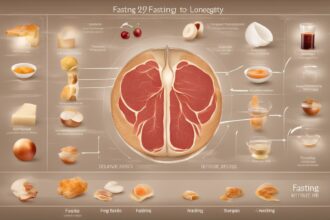Have you ever wondered if there’s a simple, natural way to extend your lifespan while boosting your overall health? Enter longevity fasting—a practice that’s gaining traction among health enthusiasts and scientists alike. Fasting, the intentional abstinence from food for specific periods, isn’t just about weight loss or detoxing. When done right, it can be a powerful tool to promote longevity, improve cellular health, and reduce the risk of chronic diseases. In this post, we’ll dive deep into how fasting for longevity works, explore the science behind it, and share actionable tips to help you incorporate this practice into your life. Let’s unlock the secrets to a longer, healthier life together!
What Is Longevity Fasting?
Longevity fasting refers to structured fasting protocols designed specifically to enhance lifespan and healthspan—the period of life spent in good health. Unlike casual fasting for weight management, fasting for longevity focuses on triggering biological processes like autophagy (cellular cleanup) and reducing inflammation, both of which are linked to aging. Common methods include intermittent fasting (like the 16:8 method, where you fast for 16 hours and eat during an 8-hour window), prolonged fasting (24–72 hours), or even periodic fasting mimicking diets (FMDs) that replicate fasting benefits with minimal calorie intake. The goal? To give your body a break from constant digestion and allow it to repair, regenerate, and thrive.
The Science Behind Fasting and Longevity
The connection between fasting and a longer life isn’t just anecdotal—it’s backed by a growing body of research. Studies on animals, like mice and worms, have shown that caloric restriction and fasting can extend lifespan by up to 30%. While human studies are still evolving, early results are promising. Fasting triggers autophagy, a process where cells recycle damaged components, which may slow aging and prevent diseases like Alzheimer’s. It also lowers insulin levels, reduces oxidative stress, and improves mitochondrial function—key factors in aging. A 2019 study in Cell Metabolism found that intermittent fasting improved markers of metabolic health in humans, suggesting a direct link to longevity through fasting. Simply put, giving your body a break from food can activate survival mechanisms that keep you healthier for longer.
Key Benefits of Longevity Fasting
Beyond just living longer, fasting for a healthier life offers a range of benefits that improve your day-to-day well-being. Here are some of the standout advantages:
- Improved Metabolic Health: Fasting helps regulate blood sugar and insulin sensitivity, reducing the risk of type 2 diabetes—a major factor in aging.
- Reduced Inflammation: Chronic inflammation accelerates aging; fasting lowers inflammatory markers, protecting your body over time.
- Enhanced Brain Function: Fasting boosts the production of brain-derived neurotrophic factor (BDNF), supporting memory and cognitive health.
- Heart Health Support: Studies show fasting can lower blood pressure, cholesterol, and triglycerides, key to a longer life.
These benefits collectively contribute to a stronger, more resilient body, making longevity fasting a holistic approach to aging gracefully.
How to Start Fasting for Longevity
If you’re new to fasting, jumping straight into a multi-day fast might feel daunting—and that’s okay! The key to successful fasting for a longer life is starting slow and listening to your body. Begin with a beginner-friendly approach like the 12:12 method (12 hours fasting, 12 hours eating) before progressing to 16:8 or longer fasts. Stay hydrated with water, herbal teas, or black coffee during fasting windows, and break your fast with nutrient-dense foods like vegetables, lean proteins, and healthy fats. It’s also wise to consult a healthcare provider, especially if you have pre-existing conditions. Remember, consistency matters more than intensity—small, sustainable changes lead to big results in longevity through fasting.
Common Mistakes to Avoid with Longevity Fasting
While fasting can be transformative, it’s easy to make mistakes that hinder your progress or harm your health. Avoid these pitfalls to ensure you’re fasting safely and effectively:
- Overdoing It Early On: Prolonged fasts without preparation can lead to fatigue, dizziness, or nutrient deficiencies—start slow.
- Ignoring Hydration: Dehydration is a common issue during fasting; aim to drink at least 8–10 glasses of water daily.
- Eating Poorly After Fasting: Breaking a fast with junk food can spike blood sugar and undo benefits—choose whole foods instead.
- Skipping Professional Advice: If you’re on medication or have health issues, fasting without guidance can be risky.
- Focusing Only on Duration: Longer isn’t always better; balance fasting with proper nutrition for sustainable longevity.
By steering clear of these errors, you’ll maximize the benefits of fasting for health and longevity without unnecessary stress on your body.
Who Should and Shouldn’t Try Longevity Fasting?
While longevity fasting offers incredible potential, it’s not a one-size-fits-all solution. It’s ideal for healthy adults looking to optimize wellness, especially those with a family history of chronic diseases like diabetes or heart issues, as fasting can act as a preventative measure. However, certain groups should approach with caution or avoid it altogether. Pregnant or breastfeeding women, individuals with eating disorders, and those with conditions like low blood pressure or severe diabetes should consult a doctor first. Children and teens, whose bodies are still developing, should also steer clear of strict fasting protocols. Always prioritize safety and personalize your approach to fasting for a longer life based on your unique needs.
In conclusion, longevity fasting isn’t just a trend—it’s a science-backed strategy to enhance your lifespan and quality of life. By tapping into your body’s natural repair mechanisms, reducing inflammation, and improving metabolic health, fasting offers a pathway to age with vitality. Whether you’re a beginner trying intermittent fasting or an experienced faster exploring prolonged protocols, the key is to start small, stay consistent, and prioritize nutrition. Remember, the journey to a longer life is a marathon, not a sprint. So, why not give fasting for longevity a try? Your future self might just thank you for it. Share your thoughts or fasting experiences in the comments—we’d love to hear how this practice has impacted your health!






